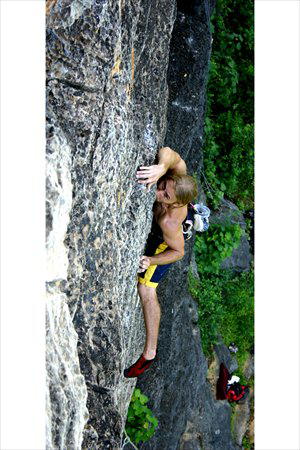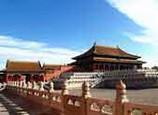
 |
| Beijing Climbing Club director Simon Adams scales a mountain in 2006 in Yangshuo, Guangxi Zhuang Autonomous Region._副本 |
"The other way is for climbers to drill into the rock and put bolts inside. These bolts are stronger and can last a long time, so are comparatively much safer."
Using the latter technique, Adams has opened four climbing routes in Miyun county.
American climber Jimmy Jurchenko, who has been an instructor for five years and opened some 20 routes in China, described their pioneering efforts as a way of giving back to the climbing community.
"True climbers are never satisfied. Once we finish a route, the feeling of fulfillment usually lasts for about 10 minutes and then we look forward to the next route. The best route is always the next route, and that's why we keep doing this," said Jurchenko, 29, who once spent two months building a route. "Even though this can be time-consuming, it is worthwhile."
Into the wild
Unlike other climbers who regard the sport as a hobby, for Adams it is a way of life. Aside from providing him with a stable income as an instructor and guide, climbing has delivered many intangible benefits.
"One of the most fascinating aspects of this sport is the opportunity to enjoy the beautiful natural surroundings. Driving just two hours in any direction [away from Beijing] takes you to good quality rock [climbing routes] and good scenery. This, plus Beijing's dry weather, makes it one of the best Chinese cities for climbing," said Adams.
There are currently around 100 expat climbers in Beijing, 50 of whom are regular outdoor climbers. Sharing the same rope and trusting your welfare with your fellow climber allows friendships to blossom, said Jurchenko.
"I have made many friends through climbing over the past few years. Though they come from different countries, they are all open-minded people who enjoy the outdoor life. You can trust them and get along with them easily," he said.
However, most climbers will tell you their greatest reward comes from testing their physical and mental limits. Reaching a summit, no matter whether it is five or 50 meters, provides a thrill from using brains as much as brawn.
"Climbing helps to develop logical thinking because you have to figure out the best route step by step. Imagination is also necessary, as sometimes when you are climbing you cannot see the general picture when you look up. In these moments, imagination helps you to build a general picture," said Adams, noting patience and calmness are also vital virtues.
For climbers, the clean air and open space their sport offers are arguably the biggest appeals in a city where commuters crowd and air pollution is hazardous. But getting too in touch with Mother Nature has its drawbacks, too.
"Sometimes we can't wait to live the city life again, usually when we spend too many days out. I remember one time when we spent six days in the mountains, the only thought in my mind was going back to town to have some delicious food at a restaurant," Adams laughed.
Culture clash
Climbing first made its foothold in China during the late 1980s. More than two decades later, there are still many people who do not know the sport or fully understand its appeal.
For Chinese climbers, sharing their passion with expats transcends cultural boundaries.
Qin Qingxiang, director of the China Mountain Development Institute (CMDI), an NGO that promotes climbing in China, told Metropolitan he had "almost endless" stories about Chinese and foreign climbers.


















 Modern movie dream in retro Mingguo street
Modern movie dream in retro Mingguo street


![]()
